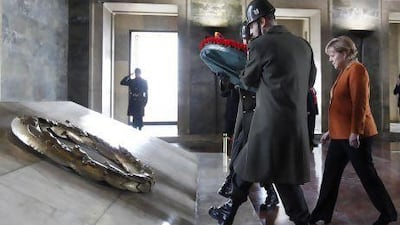ISTANBUL // The European Union's reluctance to admit Turkey as member means that officials from Brussels rarely earn praise in Ankara. But now an EU commissioner has been applauded in the Turkish capital for predicting that European leaders will "crawl on their knees" one day to beg Turkey to join.
Politicians and analysts in Turkey say the statement by the energy commissioner, Guenther Oettinger, reflects a growing realisation in Europe that the crisis-struck EU should reinvigorate stalled membership talks with Turkey, a rising regional power.
"Inevitably, many more Europeans will realise that Turkey's accession to the EU is a must to resolve many problems of the continent," Egemen Bagis, a Turkish MP and Turkey's chief negotiator in accession talks with the EU, said.
Mr Oettinger said in a speech in Brussels last week that Turkey, long seen as a poor country on Europe's periphery, was becoming stronger.
"I bet that at some point in the next decade a German chancellor and his colleague from Paris will crawl on their knees to Ankara to beg the Turks: friends, come and join us," he said.
During a visit to Ankara yesterday, Angela Merkel, Germany's chancellor and one of the leading Turkey sceptics in the EU, said she remained opposed to a Turkish EU membership.
But she said she was in favour of giving Turkey's membership bid a new push by opening negotiations on another one of 35 chapters, ranging from laws on free speech and economic rules to veterinary regulations and environmental standards, that every candidate must conclude to join the bloc. Ankara has opened talks on 13 chapters so far.
"No new chapter has been opened for a long time," Ms Merkel said in a televised news conference, in reference to a virtual standstill of negotiations since 2010. "Even one new chapter is progress."
Ms Merkel favours a "privileged partnership" between EU and Turkey. Many of her conservative voters reject Turkey, the only Muslim candidate country, as a nation that does not belong to Europe culturally.
But Ozan Ceyhun, a German politician of Turkish descent and former member of the European parliament, said he expected the EU's position to shift. "The Europeans are realising that they have to offer the Turks a bit more" to keep them interested in membership, he said.
He said the Turkish government was confident that resistance to the country's membership bid would fade as Turkey was becoming stronger economically and politically.
"They believe that the EU will need Turkey more than Turkey will need the EU," he said,
Mr Bagis said Mr Oettinger's statement was a warning to other European officials.
He told the state-run Anadolu news agency he could not say whether Europeans "will come crawling or on bended knees. But if I know one thing for sure it is that they will give in."
Turkey's government feels emboldened by the country's economic successes in recent years and by its rise as a regional power with interests in Europe, the Middle East, Africa and Asia. If Turkey were an EU member today, its economy would be the seventh strongest in the bloc, EU figures show.

